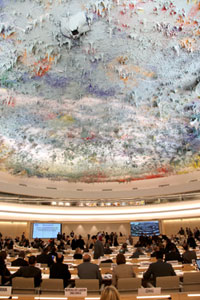Introduction

19th session of the Human Rights Council, Room XX, Palais des Nations, Geneva
© UN Photo/JeanMarc Ferre
The special procedures of the Human Rights Council are independent human rights experts with mandates to report and advise on human rights from a thematic or country-specific perspective. The system of Special Procedures is a central element of the United Nations human rights machinery and covers all human rights: civil, cultural, economic, political, and social. As of 30 September 2016 there are 43 thematic and 14 country mandates.
With the support of the Office of the United Nations High Commissioner for Human Rights (OHCHR), special procedures undertake country visits; act on individual cases and concerns of a broader, structural nature by sending communications to States and others in which they bring alleged violations or abuses to their attention; conduct thematic studies and convene expert consultations, contribute to the development of international human rights standards, engage in advocacy, raise public awareness, and provide advice for technical cooperation. Special procedures report annually to the Human Rights Council; the majority of the mandates also reports to the General Assembly. Their tasks are defined in the resolutions creating or extending their mandates.
Read more ...
What special procedures have accomplished in 2015 at a glance
The latest annual report on special procedures which covers the period from 1 January to 31 December 2015, provides updated information on the system of special procedures as a whole and its achievements, including facts and figures. It gives a comprehensive overview of the activities undertaken by special procedures in 2015, both individually and as a system, including country visits, communications, thematic reports, follow-up activities, joint actions, development of international standards and advocacy. The report also reflects the work of the Coordination Committee as well as covers the main issues discussed at the twenty-second annual meeting of special procedures of the Human Rights Council, held in Geneva from 8 to 12 June 2015.
Cooperation with the special procedures and acts of intimidation and reprisals
Engagement of individuals and groups with the special procedures without fear of reprisal is essential for the fulfilment of their mandates, as established by the Human Rights Council. Therefore addressing acts of intimidation and reprisal against those who seek to cooperate, cooperate or have cooperated with the special procedures or any other part of the United Nations system in the field of human rights is a priority for mandate holders. As a result of the growing attention given to this phenomenon and the increasing instances of intimidation and reprisals observed by mandate holders, they agreed during the 22nd Annual Meeting of Special Procedures, held in June 2015, to consolidate and enhance special procedures' response to this unacceptable practice by establishing a coherent framework for action. More information on the issue of reprisals and this framework can be found here.
